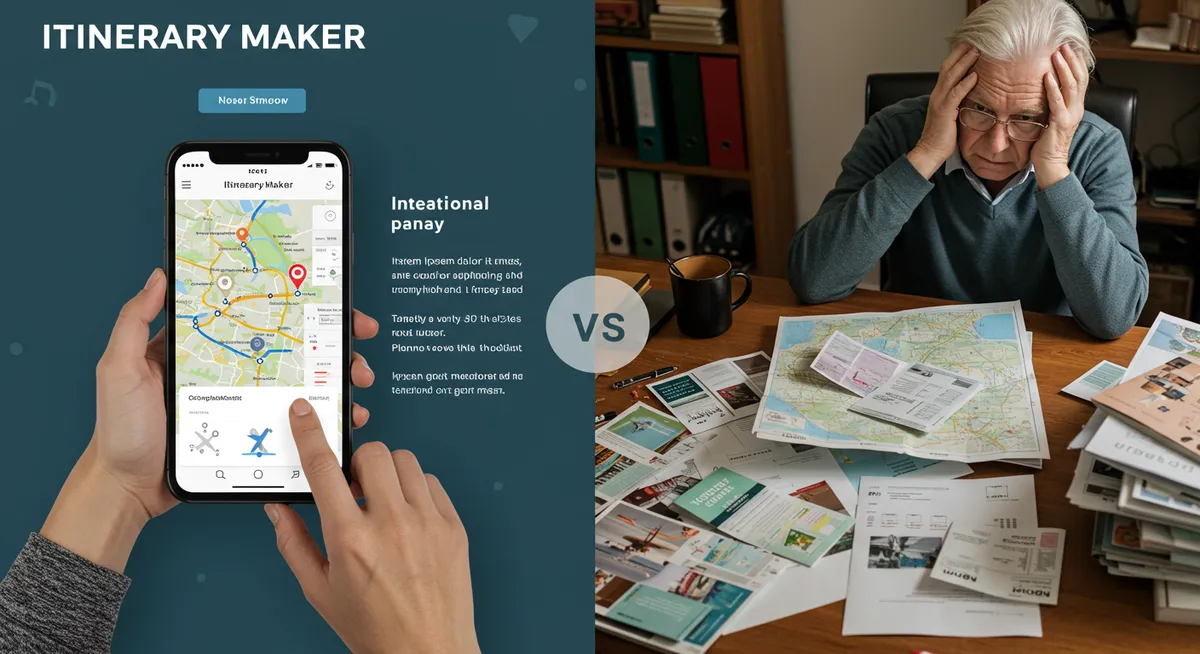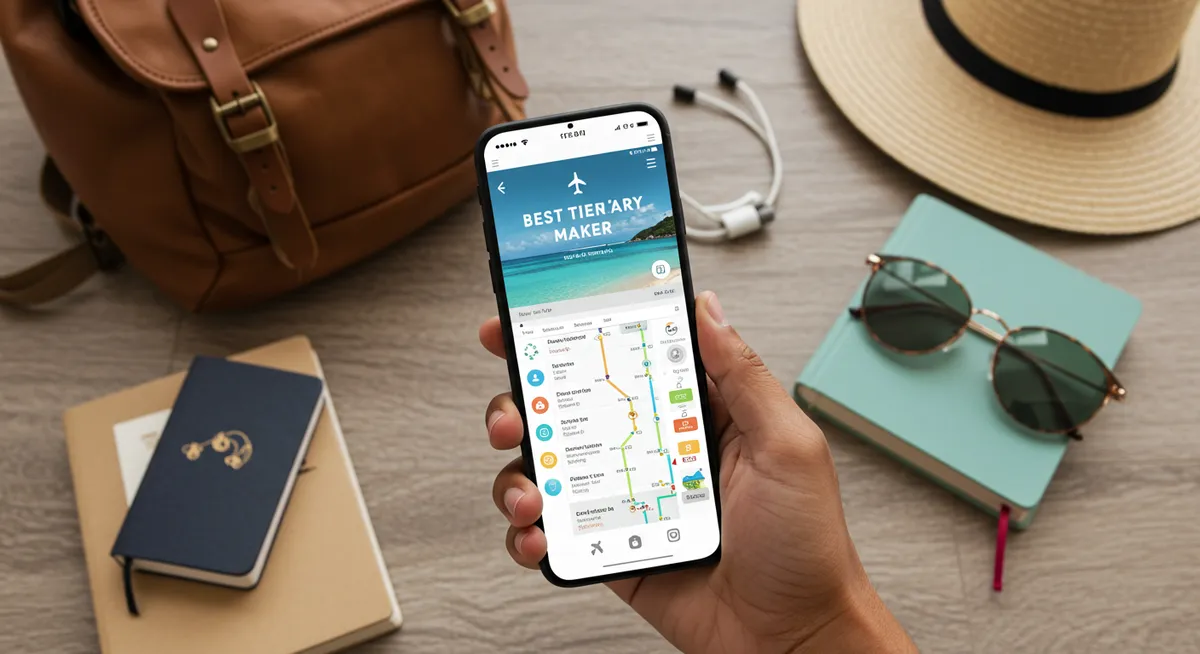Itinerary Maker vs Traditional Planners: Which is Better for Your Travel Planning?
The travel planning landscape has evolved dramatically with the introduction of AI-powered itinerary makers, challenging traditional planning methods that have been used for decades. While both approaches have their merits, understanding the differences can help you choose the most effective method for your specific travel needs. This comprehensive comparison explores the strengths and weaknesses of AI itinerary makers versus traditional planning methods, helping you make an informed decision about how to plan your next adventure.
Key Takeaways
- AI itinerary makers offer speed, personalization, and real-time updates that traditional methods can't match
- Traditional planning provides human expertise, customization, and personal touch for complex trips
- AI tools excel at data analysis and optimization, while traditional planners offer emotional intelligence
- Hybrid approaches combining both methods often yield the best results
- Cost, complexity, and personal preference are key factors in choosing your planning method
Understanding Traditional Travel Planning
Traditional travel planning encompasses methods that have been used for generations, relying on human expertise and manual processes:
Travel Agents and Consultants
Professional travel planners offer personalized service and expertise:
- Personal Relationships: Long-term relationships with hotels, airlines, and service providers
- Expert Knowledge: Deep understanding of destinations, cultures, and travel logistics
- Hands-on Service: Direct assistance with bookings, changes, and problem resolution
- Customization: Tailored recommendations based on personal preferences and past experiences
- Emergency Support: 24/7 assistance during travel emergencies
Manual Planning Methods
DIY planning using traditional resources and tools:
- Guidebooks and Magazines: Comprehensive destination information and recommendations
- Travel Forums and Communities: Peer-to-peer advice and real traveler experiences
- Spreadsheets and Documents: Manual organization of travel details and schedules
- Phone Calls and Emails: Direct communication with service providers
- Physical Maps and Brochures: Tangible resources for navigation and planning
Understanding AI Itinerary Makers
AI-powered itinerary makers represent the cutting edge of travel planning technology, offering automated, intelligent planning solutions:
Core AI Capabilities
AI itinerary makers leverage advanced technology to create optimal travel plans:
| AI Feature | Traditional Method | AI Advantage |
|---|---|---|
| Data Processing | Manual research and analysis | Processes millions of data points instantly |
| Personalization | Human judgment and experience | Machine learning algorithms adapt to preferences |
| Real-time Updates | Manual checking and updates | Automatic monitoring and instant notifications |
| Price Optimization | Manual comparison shopping | Continuous price monitoring across platforms |
| Route Optimization | Manual planning and mapping | Algorithmic optimization for efficiency |
Technology Integration
AI tools seamlessly integrate with modern travel technology:
- Mobile Apps: Access plans on smartphones and tablets
- Cloud Storage: Automatic backup and synchronization
- API Integration: Direct connection to booking platforms and services
- Voice Assistants: Hands-free access to travel information
- Augmented Reality: Enhanced navigation and information overlay
Detailed Comparison: AI vs Traditional Planning
⭐ Recommendation: Don't miss out on amazing Travel Tips tours - book now!
Let's examine the key aspects of travel planning to understand how AI and traditional methods stack up:
Speed and Efficiency
Time is a crucial factor in travel planning:
AI Itinerary Makers:
- Instant Generation: Complete itineraries created in minutes
- Automated Research: No manual searching through multiple sources
- Quick Modifications: Easy adjustments and real-time updates
- Batch Processing: Handle multiple destinations simultaneously
- 24/7 Availability: Plan anytime without waiting for business hours
Traditional Planning:
- Time-Intensive: Hours or days of manual research and coordination
- Human Limitations: Limited by working hours and availability
- Sequential Processing: One task at a time approach
- Manual Coordination: Time-consuming communication with multiple providers
- Research Requirements: Extensive manual searching and comparison
Personalization and Customization
How well each method adapts to individual preferences:
AI Itinerary Makers:
- Data-Driven Personalization: Learns from user behavior and preferences
- Preference Algorithms: Matches activities to individual interests
- Scalable Customization: Handles complex preference combinations
- Continuous Learning: Improves recommendations over time
- Objective Analysis: Unbiased recommendations based on data
Traditional Planning:
- Human Intuition: Understanding of nuanced preferences and emotions
- Personal Relationships: Knowledge of client history and preferences
- Emotional Intelligence: Understanding of travel motivations and goals
- Creative Solutions: Innovative approaches to unique requests
- Cultural Sensitivity: Understanding of cultural nuances and preferences
Cost and Value
Financial considerations for each planning method:
AI Itinerary Makers:
- Low Cost: Often free or low-cost subscription models
- No Commission: Direct booking without agent fees
- Price Optimization: Automatic finding of best deals
- Transparent Pricing: Clear cost breakdown and comparison
- Bulk Savings: Efficient planning reduces overall trip costs
Traditional Planning:
- Service Fees: Professional planning services cost money
- Commission-Based: May receive commissions from service providers
- Premium Pricing: Higher costs for personalized service
- Value-Added Services: Additional services may justify higher costs
- Relationship Benefits: Long-term relationships can lead to better deals
Accuracy and Reliability
How dependable each method is for creating accurate travel plans:
AI Itinerary Makers:
- Real-Time Data: Access to current information and availability
- Consistent Quality: Standardized approach reduces human error
- Automated Updates: Continuous monitoring of changes and availability
- Data Verification: Cross-referencing multiple sources for accuracy
- Predictive Analytics: Anticipating potential issues and alternatives
Traditional Planning:
- Human Verification: Personal checking and confirmation of details
- Experience-Based Knowledge: Understanding of common issues and solutions
- Direct Communication: Personal relationships with service providers
- Problem Resolution: Quick response to issues and changes
- Quality Assurance: Personal review and verification of all arrangements
When to Choose AI Itinerary Makers
🌟 Local Expert Tip: Get the most out of your Travel Tips visit with guided tours!
AI-powered planning tools excel in specific scenarios and for certain types of travelers:
Ideal Scenarios for AI Planning
AI itinerary makers are particularly effective for:
- Quick Planning: When you need a plan fast for last-minute trips
- Budget Travel: When cost optimization is a priority
- Simple Itineraries: For straightforward trips with clear preferences
- Tech-Savvy Travelers: Those comfortable with digital tools and apps
- Data-Driven Decisions: When you prefer objective, analytics-based recommendations
- Multiple Destinations: Complex multi-city or multi-country trips
- Frequent Travel: When you travel often and need efficient planning
AI Strengths
Key advantages of AI-powered planning:
- Speed: Generate comprehensive plans in minutes
- Cost Efficiency: Find the best deals automatically
- Consistency: Reliable quality across all recommendations
- Scalability: Handle complex, multi-destination trips
- Integration: Seamless connection with modern travel technology
- Accessibility: Available 24/7 without human limitations
- Data Analysis: Process vast amounts of information quickly
When to Choose Traditional Planning
Traditional planning methods remain valuable for specific situations and traveler preferences:
Ideal Scenarios for Traditional Planning
Traditional methods work best for:
- Complex Trips: Multi-generational travel or special requirements
- Luxury Travel: High-end experiences requiring personal attention
- Special Occasions: Honeymoons, anniversaries, or milestone celebrations
- Accessibility Needs: Travelers with special requirements or disabilities
- Cultural Immersion: Deep cultural experiences requiring local expertise
- Business Travel: Corporate travel with specific requirements
- Emerging Destinations: Places with limited online information
Traditional Planning Strengths
Key advantages of traditional planning methods:
- Personal Touch: Human understanding and emotional intelligence
- Expert Knowledge: Deep understanding of destinations and cultures
- Problem Solving: Creative solutions to unique challenges
- Relationship Building: Long-term partnerships with service providers
- Quality Assurance: Personal verification of all arrangements
- Emergency Support: Direct assistance during travel issues
- Customization: Highly personalized service and attention
Hybrid Approaches: Best of Both Worlds
Many travelers find that combining AI and traditional planning methods yields the best results:
AI for Research, Human for Refinement
Use AI to gather information and traditional methods for personalization:
- AI Research: Use AI tools to research destinations, activities, and options
- Human Consultation: Consult with travel agents for expert advice and refinement
- AI Optimization: Use AI for route optimization and scheduling
- Human Verification: Have human experts verify and enhance the final plan
- AI Monitoring: Use AI for real-time updates and changes
- Human Support: Rely on human support for complex issues and emergencies
Technology-Enhanced Traditional Planning
Traditional planners using AI tools to enhance their services:
- AI-Powered Agents: Travel agents using AI tools to improve efficiency
- Hybrid Platforms: Services that combine AI automation with human expertise
- Technology Integration: Traditional services incorporating modern technology
- Data-Enhanced Expertise: Human experts using AI insights to improve recommendations
- Automated Support: AI handling routine tasks while humans focus on complex issues
Cost Comparison: AI vs Traditional Planning
Understanding the financial implications of each planning method:
AI Itinerary Maker Costs
| Service Level | Cost Range | What's Included |
|---|---|---|
| Free Basic Plans | $0 | Basic itinerary generation, limited features |
| Premium Subscriptions | $5-20/month | Advanced features, priority support, premium content |
| Enterprise Solutions | $50-200/month | Business features, team collaboration, advanced analytics |
| One-Time Premium | $10-50 | Specialized features, detailed planning, export options |
Traditional Planning Costs
| Service Type | Cost Range | What's Included |
|---|---|---|
| Travel Agent Commission | 5-15% of trip cost | Full planning service, booking assistance, support |
| Consulting Fees | $50-200/hour | Expert advice, custom planning, consultation |
| Luxury Travel Services | $500-5000+ | Concierge service, exclusive access, premium support |
| Specialized Planning | $200-1000 | Complex itineraries, special requirements, detailed planning |
Common Questions About AI vs Traditional Planning
Can AI itinerary makers replace travel agents completely?
Are AI-generated itineraries as good as those created by travel agents?
How do I know which planning method is right for my trip?
Can I use both AI and traditional planning for the same trip?
What about emergency support and problem resolution?
Do AI itinerary makers work for all types of destinations?
Future Trends: The Evolution of Travel Planning
As technology continues to advance, the line between AI and traditional planning is becoming increasingly blurred:
AI-Enhanced Traditional Services
Traditional travel agents are adopting AI tools:
- Automated Research: AI tools for initial research and data gathering
- Predictive Analytics: AI insights to improve recommendations
- Efficiency Tools: Automation of routine tasks and communications
- Enhanced Personalization: AI-powered preference analysis
- Real-Time Updates: Automated monitoring and notifications
Human-AI Collaboration
The future of travel planning involves seamless collaboration:
- AI Assistants: AI tools working alongside human travel professionals
- Hybrid Platforms: Services that combine the best of both approaches
- Intelligent Automation: AI handling routine tasks while humans focus on complex decisions
- Enhanced Expertise: Human experts using AI insights to provide better service
- Personalized Technology: AI tools that adapt to individual travel styles and preferences
Making Your Decision: Factors to Consider
⭐ Recommendation: Don't miss out on amazing Travel Tips tours - book now!
When choosing between AI and traditional planning methods, consider these key factors:
Trip Characteristics
- Complexity: Simple trips favor AI, complex trips may need human expertise
- Budget: AI is typically more cost-effective for budget-conscious travelers
- Timeline: Last-minute trips benefit from AI speed, advance planning allows for traditional methods
- Destination: Popular destinations work well with AI, emerging destinations may need human expertise
- Special Requirements: Accessibility needs, special occasions, or unique requests often require human assistance
Personal Preferences
- Technology Comfort: Tech-savvy travelers may prefer AI tools
- Service Level: Those who value personal service may prefer traditional methods
- Control Level: AI offers more control, traditional methods offer more guidance
- Time Investment: AI requires less time investment, traditional methods may require more involvement
- Relationship Building: Those who value long-term relationships may prefer traditional agents
Conclusion: Choosing Your Planning Method
The choice between AI itinerary makers and traditional planning methods depends on your specific needs, preferences, and travel circumstances. Both approaches have their strengths and can be highly effective when used appropriately.
For many travelers, a hybrid approach that combines the speed and efficiency of AI with the expertise and personal touch of traditional planning offers the best results. Use AI tools for initial research and planning, then consult with human experts for refinement and specialized needs.
Ready to experience the power of AI-powered travel planning? Try our AI itinerary maker to see how modern technology can transform your travel planning experience. Whether you choose AI, traditional methods, or a combination of both, the key is finding the approach that works best for your unique travel style and needs.
Start planning your next adventure today and discover the perfect balance of technology and human expertise for your travel planning needs!
Find the perfect balance of AI efficiency and human expertise
- Try ItiMaker AI Itinerary Maker - Experience the power of AI planning
- How to Make Itineraries Quickly with AI - Speed up your planning process
- Budget Travel Planning - Save money with AI optimization



